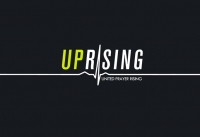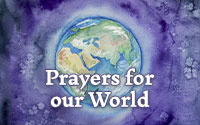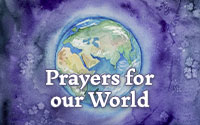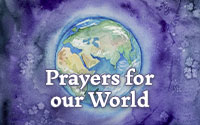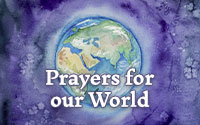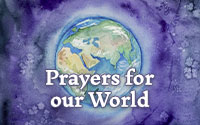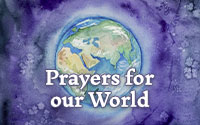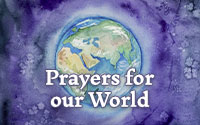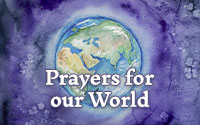1,360 new Christians at Soul Survivor
Christian youth organisation Soul Survivor has announced that 1,360 young people became Christians at its festivals this Summer. The events in July and September have seen tens of thousands gather at the sites in Staffordshire, Scotland and Somerset. Speaking on Premier's News Hour, spokesman Jonny Goodchild said, ‘It has been absolutely amazing. I don't think we're doing anything special - we're just thankful for all God is doing.’ Calling on youth workers to continue to invest in the young people who've found faith, he said, ‘It's that day-to-day relational youth work, getting alongside these young people, really journeying with them. Programmes are important but I think it's far more about relationship.’ Soul Survivor and other Christian festivals are, in many ways, a highlight of the youth ministry year; they're our 21st-century equivalent of a pilgrimage to the Temple. In our age of cynicism it's easy to get jaded, but this rhythm and pattern of youth ministry life is something to celebrate.
UPRISING 2016
United Prayer Rising in South Korea
"We will gather. We will pray.
We will see change in our regions and our nations.
This is an UPRISING."
The youth of today is under attack! Just by simply looking around, we can already see that so many issues are keeping them from stepping into their destiny as individuals and as a generation—abortion, child trafficking, sexual violence on children, child labor, teenage suicide, etc.
The need to come together and pray as one against all the giants of this generation is stirring! The spirit of Elijah cries out, “Prepare ye the way of the Lord!” We, the church, will summon and prepare the youth of our world! We will gather a generation to seek His face, for such a time as this. We will invite them to get connected to one another and to be released into their destiny for their generation and the generations to come. We will gather them for an UPRISING!
Following the World Prayer Assembly (WPA) held in Jakarta last 2012, there was a sense of unity of expectations among the leaders of the International Prayer Council (IPC) regarding the next step: it is time for the young, emerging leaders of this generation to organize, mobilize, and pray. They all felt that a NEW WAVE of prayer and missions movements is coming and is now here—for the youth, by the youth. So, the dream to do a World YOUTH Prayer Assembly was initiated, and after much prayer and consultation, it was later on called “UPRISING (United Prayer Rising)”, and it is set to take place on July 26-30, 2016 in Seoul, South Korea.
UPRISING will call forth and engage an emerging generation, tens of thousands from every nation, to challenge and empower them to fulfill their destiny as catalysts for Christ's Kingdom. It will be a springboard for new youth movements, new youth ministries, and new prayer and missions movements. It could also possibly give birth to a new, global Jesus Movement, finding their beginnings at the UPRISING.
The collaboration developed, the unity forged, and the streams synergized will bring a connected, global generation into a focused destiny. And in light of the gathering on 2016 in Seoul, the synergy will potentially break the spirit of division in North and South Korea. A day trip to the DMZ (the border between North and South Korea) will be arranged for these youth leaders to come against the spirit of division, and re-infuse new energy for a revival in Korea.
We expect this gathering will stir the youth to seize their destinies to bring Jesus Christ to their nations.Just one, God-ordained moment in this event will change their lives forever, and our world will never be the same!
UPRISING is GLOBAL.
We are looking for ordinary people from every nation who will extraordinarily impact their world. (Acts 17:6)
UPRISING is about PRAYER.
We are gathering those who believe their prayers matter. We are calling forth ones who are willing to fight and make a sacrifice together, those who will seek the face of God to bring justice and peace among the nations. (1 Peter 4: 7-8, Joel 2:15, Joel 3:9-10, Psalm 24:6, Isaiah 2:2-4)
UPRISING is about GENERATIONS.
We are gathering the old and the young who will honor each other and bring healing between generations. We are gathering the bold and the brave who will make a stand and will set a standard for their generation. (Malachi 4:5-6, Luke 1:17, 1 Timothy 4:12, Psalm 110:3)
UPRISING is a CONVERGENCE.
As the sun rises, the UPRISING will start from the East, where voices will be one in amplifying the sound of Hope that has come and is coming. We are gathering those who are ready to witness God’s glory released to the nations. (John 17: 21, Isaiah 40:3-5, Psalm 113:3, Isaiah 60, Psalm 2, Habakkuk 2:14)
Psalm 24 says that there will be a generation who’s DNA is to seek His face. UPRISING believes that the search is over; THIS IS THE GENERATION GOD HAS BEEN WAITING FOR.
In his 2010 book, Erwin Lutzer uses the example of Germany and Hitler’s Third Reich to reveal trends that can transform a modern, educated, well developed society into a oppressive, barbarous, genocidal one that caused the deaths of tens of millions before and during World War II. As you read it, you will most likely see some of the same kind of trends appearing in our own nations, especially in the West. For prayer people, understanding such patterns and where they lead can be helpful in counteracting such moves through prayer and action before they bear such horrific fruit.
In brief, the trends and principles he identifies from Nazi Germany that are also chapter headings in his book are:
- When God is separated from the government, judgment follows.
- It’s always the economy.
- That which is legal might also be evil.
- Propaganda can change a nation.
- Parents- not the state- are responsible for a child’s training.
- Ordinary heroes can make a difference.
- We must exalt the Cross in the gathering darkness.
We would do well to observe our own nations in light of these findings, being ready to pray proactively and act accordingly. When a Nation Forgets God is a valuable resource and is available through Amazon.com.
The Global Isaachar Group for South Asia met for the first time in Sri Lanka in August. Forty mostly senior leaders from the region (plus a few Westerners) came together for sharing insights and prayer. Presentations were made about the battle between darkness and light in each nation, and we noticed some of the similarities between the various gods that were still worshipped by millions in the region.
During the consultation we had many times of prayer. At one of them there was a spontaneous time of reconciliation between leaders from what we call P land and Indian brothers & sisters. This was deemed very important and moving. The very next day the news came that the PM's of each country agreed to meet the following week for talks - a major breakthrough!
Some of the comments from the participants included "the best consultation", "I've met the real generals in God's army", "deeply moving and precious time together", "an awesome event", "I was blessed by the depth and wisdom of the participants", "an incredible event - lots of insights and learning to put into practice" "all the brothers and sisters who shared from vast repertoire of experience and knowledge." Our hosts - all of them senior leaders within Sri Lanka - were wonderful and gracious. Christ oozed out of them.
The GIG (as we call it) is a task force of the International Prayer Council. We would like to see similar consultations in other regions of the world. It is important for us all to have understanding of the times - about the prevailing influences - both current and historic - which keep millions of people in bondage. We need to understand how, through strategic prayer, we can be influential in changing the spiritual atmosphere and bringing Christ's freedom to them.
So, to God be the glory! Pray for the S. Asia core group that will take this initiative forward into the future. I believe it is a new day for the region. "For the first time", the participants said, "we have discovered a South Asian identity"!
In Christ,
Brian.
Stratfor.com
August 15, 2015 | 17:57 GMT
A spate of bombings across Baghdad left 24 people dead Aug. 15, Reuters reported. The blasts went off in Taji to the north, Jisr Diyala, Madaen, Iskan and other areas. The deadliest of these was carried out in the Shiite district of Habibiya and killed 15, wounding 35 others. Earlier, an Islamic State truck bombing in Sadr City killed 70 people Aug. 13. The Iraqi military and allied militant groups are currently fighting the Islamic State in Sunni-dominated areas of Iraq. Prime Minister Haider al-Abadi is attempting to prevent the country from further fragmentation.
Please pray for the unity of the Christian leaders in Iraq, many of whom we have heard are quite divided. Unless they come together and get reconciled, the evil one can further exploit the situation and divide and destroy the nation. This is a crucial matter that needs our prayers so that Iraq can be healed and restored with its enemies driven out. The spiritual leaders of a nation set the tone for the political ones.
Jonathan Cahn
MESSAGE FROM JONATHAN CAHN: AUGUST 2015 – YouTube
Published on Aug 11, 2015
Jonathan Cahn gives an important word for believers regarding where we are and things to come - to answer the deluge of questions which have been pouring in from around the world.
"The Lord laughs at the wicked for he knows their day is coming." Ps 37:13
MONSOON FLOODING
Pakistan is going through some hard times, first with extreme heat with thousands dying. Now the monsoons have hit and there is heavy flooding across much of the country. Several years ago we had extremely heavy flooding. In the last two years Tarbala and Mangla (two of the largest dams in the world) have been very low with not enough water for irrigation. Both dams are now full to within a foot of the top. And the monsoons are not over yet. To let the water go means even more flooding in the lower plains. There are more than a million people who have lost homes, cities, livestock. Fields are being swept away. Our tribal people who live on the edge of the desert and perhaps get 1/2 inch of rain a year say their mud homes are standing in water and collapsing. For those of you from the west, think of this - people have no insurance, no help. When they lose everything, they become destitute.
PRAYER
Ø Pray for those who have lost everything and are destitute.
Ø Pray against the misuse of aid. Al Qaeda is taking foreign aid and distributing it as aid from themselves.
Ø The right control of the distribution of flood water. The pirs are blasting river dams on the wrong side to save their demonic strongholds and diverting water to where large populations of people live.
THE FALL OF EVIL LEADERS- God works miraculously.
Jehoshaphat prayed when the enemy was upon them, and then went out and found that God had gone before them and destroyed the enemy. Several of the most dangerous leaders in the world have been removed.
The Taliban announced that Mullah Omar has died - in a Pakistani Hospital about 2 years ago. They tried to keep it secret so that there would not be disunity in the group. The top contender to replace him is Maulana Akhtar Mansoor. In Pakistan the leader of the largest Taliban group along the Afghan border died this week. He has been replaced by his son.
In Pakistan, let's turn our attention to A.Q. that works throughout the world. Malik Ishaq Gullani was killed when some of his people tried to rescue him from a police escort. He and two of his sons were killed along with 15 others of his group. He was one of the most dangerous A.Q. leaders, a genius in strategy. He was in on the planning of September 11; he planned the Mumbai attack in India; the list is endless in Pakistan and around the world. He was in on starting the training school in Pakistan that sends thousands of terrorists around the world. He also trained over 200,000 suicide bombers.
God says, "The Lord laughs at the wicked for he knows their days are numbered "
Like Jehoshaphat who brought the people together and first prayed, we also must do the same. "Pray and I will hear and answer." PRAISE God that these leaders in the T. and A.Q. have been removed by God. PRAY as there is tremendous infighting in these groups as to who will take their place. PRAY that like the enemies of Jehoshaphat they will fight amongst themselves and destroy each other.
Thank you for praying. These are miraculous answers to prayer.
Continue to PRAY for four areas of the country we have been praying for- that prayer might be built up and that they might go into these strongholds and pray and see God bring them down with the terrorist leaders.
August 13, 2015 | 12:07 GMT
Chadian President Idriss Deby said Aug. 12 that Nigerian jihadist group Boko Haram, which now calls itself Wilayat al-Sudan al-Gharbi, has elected a new leader, heightening speculation that the previous chief, Abubakar Shekau, may have been killed, This Day Live reported Aug. 13. The new leader reportedly is Mahamat Daoud. Shekau has not been seen any of the group's videos for months. Chadian efforts to to combat Boko Haram have succeeded in decapitating the group, Deby said, and the campaign will be completed by the end of 2015. Small groups of Boko Haram members remain scattered throughout northeastern Nigeria, near the Cameroonian border, he said. Jihadist groups continue to function even after their leaders are killed.
BBC.com
Thank God that progress is being made in overcoming the Boko Haram terrorists. Pray that their new leader will be brought to justice along with all the BH members who have carried out so much destruction in West Africa. Pray for the return of all their captives and for the healing and restoration of the areas they have harmed.
American Christian Trust
46-E Peninsula Center, #423 s Rolling Hills Estates, CA 90274 s (310) 373-1775 This email address is being protected from spambots. You need JavaScript enabled to view it.
Thank you so much for your concern and dedication to pray for Israel. Below is an alphabetical list of current news sources that you may use to keep up on current events regarding Israel. We hope this will help you to pray appropriately.
- Aish HaTorah: http://www.aish.com
One of the world’s largest Jewish educational organizations.
- American-Israeli Cooperative Enterprise: http://www.jewishvirtuallibrary.org
To provide a vehicle for the research, study, discussion and exchange of views concerning nonmilitary cooperation between the peoples and governments of the United States and Israel.
- Bridges for Peace: http://www.bridgesforpeace.com
Bridges for Peace is a Jerusalem based Bible believing Christian organization supporting Israel and building relationships between Christians and Jews worldwide through education and practical deeds expressing God’s love and mercy.
- Christian Friends of Israel: http://www.cfijerusalem.org
Christian Friends of Israel led by Ray and Sharon Sanders is a Jerusalem based ministry that exists to comfort and support the people of Israel through practical means.
- Christian Friends of Israeli Communities: http://www.cfoic.com
Christian Friends of Israeli Communities provides a much needed vehicle for Christians to become better informed about the Jewish communities in the heartland of Biblical Israel.
- Christian Friends of Yad Vashem: http://www.yadvashem.org
Christian Friends of Yad Vashem was established to raise awareness about the Holocaust and its universal lessons in Christian communities.
- Christians United for Israel: http://www.cufi.org
Christians United for Israel is the largest pro-Israel organization in the United States.
- The Embassy of Israel in Washington, D.C.: http://www.israelemb.org
The Embassy provides a variety of resources for up-to-date information directly from the Israeli government.
- Emergency Volunteers Project: http://www.evp.org.il
The Emergency Volunteers Project’s mission is to recruit and train dedicated individuals and communities who will serve as a backup force of Emergency First Responders in Israel.
- Endowment for Middle East Truth: http://www.emetonline.org
Endowment for Middle East Truth (EMET) is a Washington, DC based think tank and policy center with an unabashedly pro-America and pro-Israel stance.
- European Coalition for Israel: http://www.ec4i.org
A Christian Initiative promoting European-Israeli cooperation
- International Christian Embassy Jerusalem: http://www.icej.org
The ICEJ was formed in 1980 as an evangelical Christian response to the need to comfort Zion according to the command of scripture in Isaiah 40:1-2. The ICEJ News Service provides timely balanced updates on the latest developments in the region. You may subscribe to this free service on their home page.
- International Fellowship of Christians and Jews: http://www.ifcj.org
The Fellowship was founded in 1983 by Rabbi Yechiel Eckstein to promote understanding and cooperation between Jews and Christians and to build broad support for Israel and other shared concerns.
- Israel Allies Foundation: http://www.israelallies.org
The Israel Allies Foundation works with Congress and parliaments around the world to mobilize political support for Israel based on Judeo-Christian values.
- Israel Ministry of Foreign Affairs: http://www.mfa.gov.il
An official government website
- Israel 21c Newsletter: http://www.israel21c.org
Israel 21c hopes their feature articles on Israeli advancements in health, technology and democracy will create a greater awareness about the vibrant Israel, which exists beyond headlines of conflict. Click on About Us on the website to sign up for e-mail updates.
- Israel Vision: http://www.israelvision.com
Israel Vision provides you with the kinds of media tools that give you, your family, your church and your community a balanced view of unfolding events in the Middle East. They provide historic facts as well as on-site investigative reports that often fill the information gap.
- Jerusalem Center for Public Affairs: http://www.jcpa.org
An independent institute for policy research headed by former U.N. Ambassador Dr. Dore Gold
- The Jerusalem Connection: http://www.thejerusalemconnection.us
To inform, educate and activate Christians and Jews to be pro-active instruments of God’s love and blessing for Israel and the Jewish people
- Jerusalem Watchman: http://www.jerusalemwatchman.org
Stan Goodenough is a Christian journalist who lives in Jerusalem and provided timely commentary on current events.
- Jewish National Fund: http://www.jnf.org
JNF is a global leader in environmental issues having planted over 250 million trees and provided the infrastructure for over 1000 communities in Israel.
- Kehilat HaCarmel: http://www.carmel-assembly.org.il
A Christian congregation located in Haifa on Mount Carmel.
- Knesset Christian Allies Caucus: http://www.cac.org.il
The mission of the Knesset Christian Allies Caucus is to build direct lines of communication, cooperation and coordination between the Knesset and Christian leaders around the world.
- King of Kings Community Jerusalem: http://www.kkcj.org
A non-denominational Christian congregation located in Jerusalem.
- Unity Coalition for Israel: http://www.IsraelUnityCoalition.org
Unity Coalition for Israel is the largest worldwide coalition of Jewish and Christian organizations, with more than 200 groups representing millions of people dedicated to Israel. Visit their website and click on Subscribe to “Today’s News Summaries” to receive all their latest information.
Abraham Lincoln once said, "I have been driven to my knees many times by the conviction that I had nowhere else to go. My own wisdom, and that of all about me, seemed insufficient for the day".
Such was the case when key Christian leaders got together at the beginning of July 2015 and in desperation called for '21 Days of Prayer and Fasting for a 'Miracle for Marriage' from 20 July to Sunday 9 August 2015.
The good news is that things happen when people pray!
Below are nine miracles that the Canberra Declaration Team believes came about because of answered prayers. We know that much blood, sweat, and tears were involved in everything surrounding these wonderful outcomes, but as St Augustine said, "Without God, I can't. Without me, He won't." Soli deo Gloria! (To God be the glory!)
1. On Monday 10 August over 3,000 bouquets of flowers landed on the lawns of
Parliament House, Canberra, addressed to the Prime Minister, with thousands of Thank You's. The miracle is that although correct protocols were not met, the message still got through to the PM and parliamentarians.
2. A full page advert ran in The Australian on Monday 10 August which helped to influence a miracle vote in the Coalition Party Room. The miracle is the supply of God's provision to the wonderful team at the Marriage Forum who sponsored the advert.
3. The decisive and overwhelming majority vote in support of traditional marriage by the Coalition members in the marathon party room meeting. It started at 9AM and finished at 10.30PM (with some lengthy breaks throughout the day). The miracle is the massive margin of 33 votes, with 66 votes cast for retaining marriage as party policy to 33 against.
4. Katy Faust from USA and Millie Fontana from Melbourne, who have both experienced as children the challenges associated with same-sex parenting, shared their personal stories with parliamentarians from 11-13 August. The miracle is the open door invitation by parliamentarians who wanted to hear the truth for themselves about the injustices that the redefinition of marriage inflicts on children. Millie's story was quoted in the party room.
5. On Wednesday 12 August, Katy Faust appeared on Lateline and her interview became one of the most popular videos in the history of Lateline. The miracle is the eloquence of Katy Faust and the fact that Tony Jones and that the ABC, unashamed proponents of homosexual marriage, aired the interview.
6. On Thursday 13 August, the Uluru Bark Petition, in support of marriage, was launched at Parliament House, Canberra by over 70 Indigenous elders and leaders, from all over Australia. The miracle is the unity and sacrifice that brought them together at short notice.
7. On Friday 14 August, a tabloid size advert appeared in The Australian (page 4) advertising the full Uluru Bark Petition in both Pitjantjatjara and English to 492,000 influential Australians. The miracle is the supply of finance to create and run the advertisement.
8. On Monday 17 August, ABC Media Watch exposed the incredible bias against supporters of marriage between a man and a woman by the Australian media elite. The miracle is that the truth was told on ABC TV. Thank God for the Marriage Alliance.
9. On Monday 17 August the highly anti-family, pro-homosexual Q & A program, featured not one but two supporters of marriage between a man and a woman. Usually the odds are 5 to 1 against, but in this case the odds were only 4 to 2 against; Tony Jones also being an avid supporter of homosexual marriage. The miracle is that Brendan O'Neill, a Marxist atheist and Katy Faust bravely hit the ball right out of the ball park. See the full show here.
The miracles continued this week with Brendan O'Neill's article in The Australian called the 'Perfectly Normal are branded as Bigots' and the brilliant article in the Courier Mail by Jane Fynes-Clinton, exposing the intolerance of those who want to redefine marriage.
The team at the Canberra Declaration are in awe of the combined effect of all these separate miracles to create one big 'Miracle for Marriage'.
God has truly answered our prayers. To Him be all the glory.
We ask you to do two things:
1. Give thanks to God and pray for the breakthrough to continue.
2. Sign the Uluru Bark Petition in support of marriage between a man and a woman and tell all your friends to do the same. Together we can make a difference. Soli deo Gloria.
Yours for more Marriage Miracles
Warwick Marsh and Ben Pratt
Stratfor.com August 22, 2015 | 18:23 GMT
Pakistan's Ministry of Foreign Affairs announced Aug. 22 that Pakistan will not attend the planned national security advisor talks citing "preconditions" set by India earlier in the day, the Express Tribune reported. The Pakistani government specifically mentioned that it could not accept India's conditions to limit the talks to ways of ending terrorism and maintaining tranquility on the Line of Control. Representatives of the Indian government denied that they had set preconditions. Indian Foreign Minister Sushma Swaraj said earlier that talks could be delayed if Pakistani National Security Advisor Sartaj Aziz insisted on meeting with Kashmiri separatist leaders.
Let’s pray for the soon rescheduling of these security talks. The border between India and Pakistan is probably the most dangerous one on earth since both nations have nuclear weapons. May their be a thaw in the relationship of these South Asian enemies!


